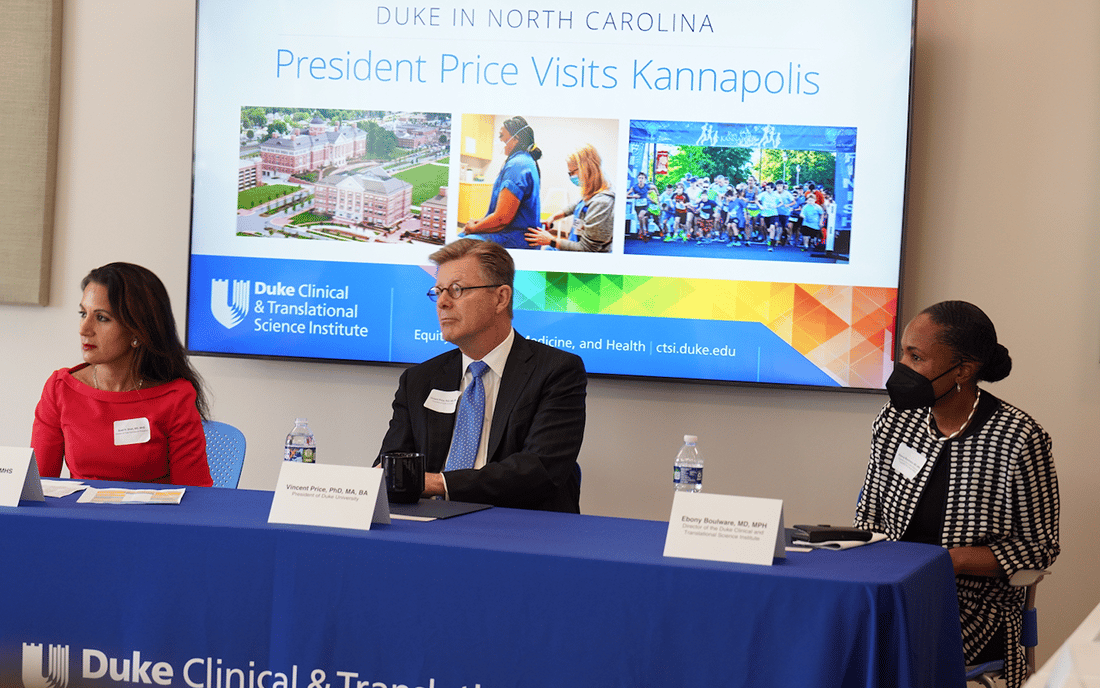
Duke Kannapolis Strengthens University’s Research Mission Across North Carolina
KANNAPOLIS, N.C.—Duke University President Vincent E. Price visited Duke’s clinical research office at the North Carolina Research Campus in Kannapolis today. A part of the Duke Clinical and Translational Science Institute (CTSI), Duke Kannapolis demonstrates Duke’s commitment to advancing community health and improving lives across the state.
During roundtable discussions with 25 Duke scientists, community leaders, and study participants, Price spent the morning learning more about the research facility that has enrolled nearly 14,000 volunteers in dozens of studies using a successful community-engaged research model.
“Through community-based research and partnerships, Duke Kannapolis is on the forefront of population health research,” said Price, 10th president of Duke University and the first to visit Duke Kannapolis. “I am very grateful for the community leaders in Kannapolis and across the state who are strengthening Duke’s research and education missions to serve North Carolinians.”
Newly appointed Director Svati H. Shah, M.D., M.H.S., welcomed Price to Duke Kannapolis, which was founded in 2007 by Robert Califf, M.D., Duke adjunct professor of medicine and commissioner of the U.S. Food and Drug Administration.
“I am so grateful for the time President Price gave us today to hear our story, see for himself the amazing work that’s happening here, and meet the extraordinary people who make this work a success,” said Shah. “Our partnership with our community in Kannapolis and Cabarrus County remains a vital and essential component of our success at Duke Kannapolis.”
Shah, who was tapped to lead Duke Kannapolis by CTSI Director L. Ebony Boulware, M.D., M.P.H., shared her vision to continue expanding work in omics, precision medicine, and population health with an increased focus on digital health, artificial intelligence, and genomic medicine to accelerate the translation of research to improved patient care.
While she builds new partnerships both within Duke and at the North Carolina Research Campus, Shah said the most important partner for Duke Kannapolis will remain the community itself.
“Our partnership with you, our community collaborators in Kannapolis and Cabarrus County, is the single most essential component of our success,” she told local leaders and study participants. “With your vision in reimagining the quality of life for your community, there is more for us to do and accomplish together.”
Community stakeholders included representatives from the city of Kannapolis, the city of Concord, Cabarrus Health Alliance, and El Puente Hispano, as well as participants in studies ranging from COVID-19 research to low back pain. N.C. Rep. Kristin Baker attended, along with Deepak Kumar, Ph.D., director of North Carolina Central University’s Julius L. Chambers Biomedical/Biotechnology Research Institute, who serves as the scientific leader of research facilities in Kannapolis and Durham.
As leader of the CTSI, Boulware thanked the Kannapolis team for ensuring that clinical research continues to flourish at Duke, noting that knowledge gained through research will ultimately improve the health of communities.
“Not only is vital clinical research taking place here, but our CTSI team in Kannapolis always places study participants at the center of everything they do,” Boulware said. “This community-based approach is the gold standard, and investigator after investigator tells me of their remarkable experience working with this team on grants, projects, and initiatives.”
After touring the Appalachian State University Human Performance Laboratory and UNC Nutrition Research Institute, Price ended his four-hour visit with a nod to the remarkable transformation of Kannapolis, home for more than a century to a massive textile mill shuttered in 2003 during the largest single layoff in North Carolina history. Today, the city is thriving and growing, focused on health, research, and innovation, and the North Carolina Research Campus stands where Cannon Mills once stood.
“I am very proud of the extraordinary research conducted at Duke Kannapolis,” Price said. “The collaborative, community-based approach is an innovative model to address the most pressing challenges and promote healthier and more equitable communities in North Carolina and beyond.”
ABOUT DUKE KANNAPOLIS
Founded in 2007 on the North Carolina Research Campus, Duke Kannapolis has enrolled nearly 14,000 participants using a successful community-based engagement. A part of the Duke Clinical and Translational Science Institute, Duke Kannapolis manages a wide variety of research projects focusing on the exploration, discovery, and validation of biomarkers that will inform a deeper understanding of health and disease. Our facility functions as an engine to accelerate population health research, supporting the Duke research community and external collaborators and partners. For more information, visitctsi.duke.edu/duke-kannapolis.
ABOUT DUKE CTSI
The Duke Clinical and Translational Science Institute (CTSI) catalyzes and accelerates the innovation and translation of scientific discoveries into health benefits for patients and communities through collaborative research. Our NIH Clinical and Translational Science Award (CTSA) funding enables us to offer programs, project management and navigator services, and data sharing and informatics resources that provide essential support to move ideas from the laboratory through early-phase clinical trials and facilitate education for current and future translational medicine researchers. For more information, visit ctsi.duke.edu.
Appalachian State University, COVID-19, Duke CTSI, Duke University, Kannapolis NC, Low-Back Pain, North Carolina Research Campus
